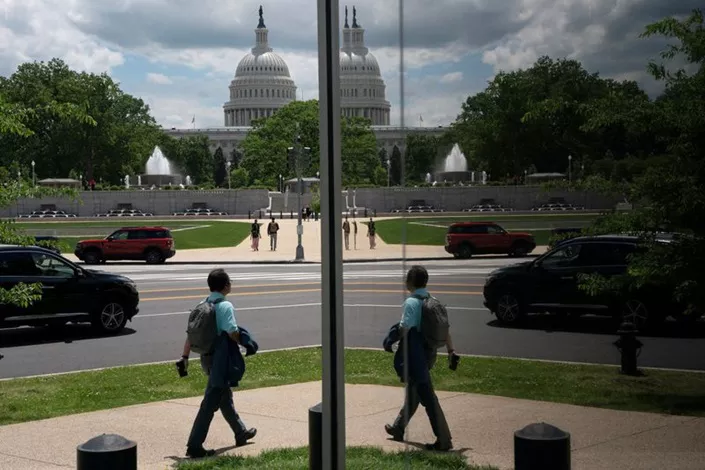Republicans in the U.S. Congress moved forward on major parts of President Donald Trump’s budget plan on Wednesday. Key committees approved tax cuts that could add trillions to the national debt while reducing healthcare spending for the poor and disabled.
With Democrats boycotting this priority, Republicans used their majority in the House Ways and Means Committee and the Energy and Commerce Committee to advance the bills. These committees oversee taxes and Medicaid, respectively.
Republicans defeated every Democratic amendment to the bill, showing their strong control. This is an early win for Republicans, but many challenges remain before the package becomes law.
Trump’s budget, called the “Big Beautiful Bill,” would increase the national debt by about $4 trillion. The current U.S. debt stands at $36.2 trillion, or 127% of the country’s GDP. The exact cost of the package is still unclear.
House Speaker Mike Johnson, a Republican, said the party aims to pass the bill before the Memorial Day holiday on May 26. However, some Republicans, especially moderates from states like New York, New Jersey, and California, oppose parts of the plan.
These moderate lawmakers want a higher limit on how much state and local taxes (SALT) can be deducted from federal income taxes. Representative Mike Lawler of New York, a supporter of SALT deductions, said, “As it stands now, I am a ’no.’ They need to find a quick solution if they want to keep the schedule.”
On the other hand, party hardliners demand bigger spending cuts. South Carolina Republican Ralph Norman said, “I’m trying to get the math in order to get this country back on track financially. It just hasn’t happened yet.”
After a 26-hour work session, the Energy and Commerce Committee approved a plan along party lines to tighten Medicaid eligibility. Medicaid currently covers 71 million low-income Americans.
The committee spent much of Wednesday debating abortion, prescription drug costs, and healthcare expenses. Democrats tried but failed to remove a clause that stops Medicaid funding to Planned Parenthood, a provider mainly for low-income women that offers abortion services where legal.
Democratic Representative Lizzie Fletcher of Texas said the bill would cut Medicaid funds to Planned Parenthood even in states where abortion is banned, affecting services like cancer screenings and pregnancy care.
Committee’s top Democrat Frank Pallone criticized Republicans for focusing on cost cuts to fund tax breaks for the wealthy instead of sound healthcare policy. He asked, “Why are we just talking about numbers, how much we’re going to save to pay for these tax cuts?”
Republican Buddy Carter defended the Medicaid changes, saying they would not harm those who qualify. “We are trying to stabilize, secure, and save it,” he said.
The Congressional Budget Office estimates the Medicaid changes would save $715 billion but also remove 7.7 million people from the program.
Meanwhile, another committee worked on agriculture and nutrition issues, including proposals to require some SNAP food benefit recipients to work and shift costs to states.
The bill extends tax cuts from Trump’s first term, set to expire at year-end, and adds new breaks for workers, retirees, and private schools. To help pay for these, it cancels green-energy programs started under President Joe Biden.
With the debt ceiling deadline looming this summer, Republicans are rushing. The package would raise the debt limit by $4 trillion. Treasury Secretary Scott Bessent warned lawmakers to act by mid-July to avoid a default that could disrupt the global economy.
Related topics:


